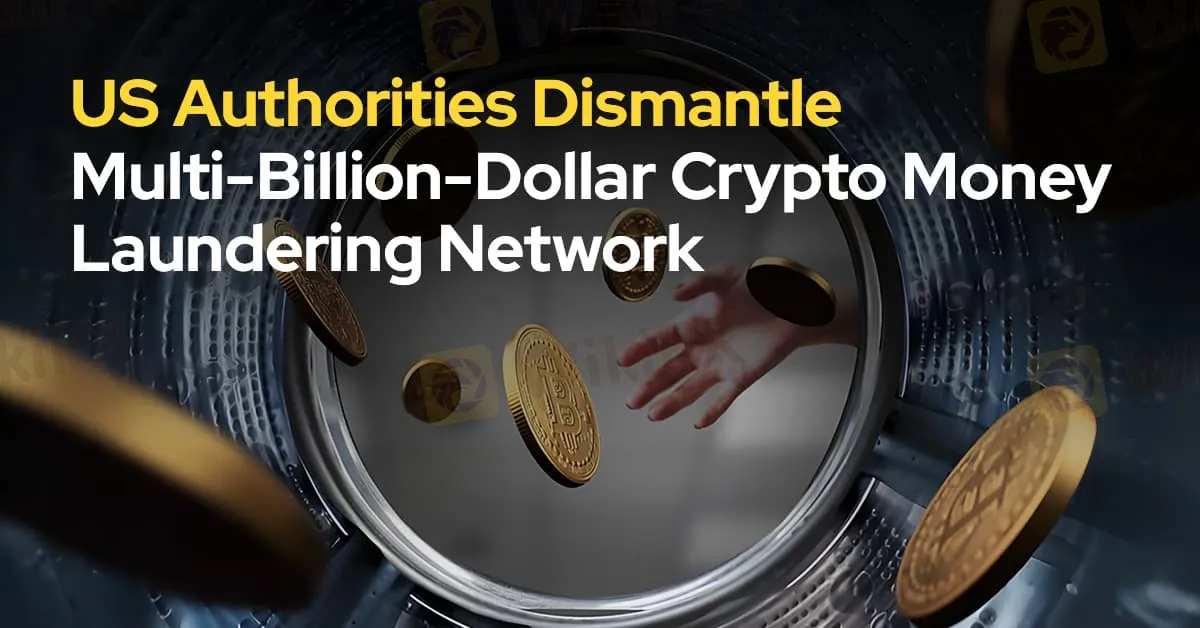US Authorities Dismantle Multi-Billion-Dollar Crypto Money Laundering Network
Abstract:Two Russian individuals have been charged by the US government in connection with a multi-billion-dollar money laundering operation, part of a broader cybercriminal network.

Two individuals have been charged by the US government in connection with a multi-billion-dollar money laundering operation, part of a broader cybercriminal network. The US Department of Justice (DOJ), in collaboration with international law enforcement agencies, disrupted the operation and seized several websites linked to illegal cryptocurrency exchange activities.
According to the DOJ, the individuals, both of Russian nationality, were allegedly running cryptocurrency exchanges used primarily for laundering illicit funds. Their platforms catered to a wide range of cybercriminals, including ransomware operators, darknet drug traffickers, and fraudsters. The exchanges reportedly facilitated transactions involving stolen credit card data, ransomware profits, and other fraudulent gains.

One of the accused is believed to have laundered over $1.15 billion through cryptocurrency linked to various criminal activities. The investigation revealed that 32% of the bitcoins traced back to the individual came from illegal sources, including ransomware payments and darknet markets. Additionally, the operation was tied to a major security breach in 2013, which targeted a US retailer and resulted in damages exceeding $202 million.
US Attorney Jessica Aber, for the Eastern District of Virginia, highlighted the relentless pursuit of cybercriminals, stating that “every step cybercriminals take in their pursuit of money leaves another track that leads us to their doorstep.” She emphasized that no matter the layers of anonymity offered by these platforms, law enforcement would continue to dismantle such operations.
One of the cryptocurrency exchanges involved, Cryptex.net, was designed to provide complete anonymity to its users, making it a popular platform for cybercriminals seeking to evade know-your-customer (KYC) regulations. Blockchain analysis revealed that 31% of the $1.4 billion transacted through Cryptex was linked to illegal sources, including ransomware and fraud. The DOJ, working with foreign partners, seized domain names connected to Cryptex, effectively shutting down the platform.
As part of the international effort, Dutch authorities seized servers associated with the Cryptex exchange and confiscated approximately $7 million in cryptocurrency. Other agencies involved in the takedown included law enforcement bodies from Germany, Latvia, the United Kingdom, and Europol.
To further pursue the accused, the US State Department has announced rewards of up to $11 million for information leading to their arrest. In addition, the US Treasury Department's Financial Crimes Enforcement Network (FinCEN) designated one of the platforms, PM2BTC, as a “primary money laundering concern” and imposed sanctions on both Cryptex and the individuals involved in the scheme.
This joint operation marks a significant step in combating global cybercriminal networks and the use of cryptocurrencies in laundering illicit funds.

Read more

Gigamax Scam: Tracking Key Suspects in RM7 Million Crypto Fraud
Malaysian authorities are actively pursuing seven individuals linked to the Gigamax investment scam, which has defrauded investors of over RM7 million. The suspects include an Indonesian national, identified as Awaludin, who is believed to be the mastermind behind the scheme, and six Malaysians who served as promoters and speakers for the fraudulent operation.

Singaporean Arrested in Thailand for 22.4 Million Baht Crypto Scam
Thai authorities have apprehended a 32-year-old Singaporean man suspected of being part of a transnational syndicate involved in cryptocurrency scams. The group is accused of defrauding victims of more than 22.4 million baht (S$886,000) through a fraudulent trading platform.

Kraken and BitGo to Handle FTX Payouts Starting January 2025
Kraken and BitGo will oversee the first FTX payouts starting January 3, 2025. 98% of creditors receive at least 118% of their claims in cash.

FCA Seeks Input to Shape UK Crypto Market Regulations
UK FCA seeks public feedback on crypto rules to improve market transparency, protect consumers, and support growth. Comments are open until March 2025.
WikiFX Broker
Latest News
Geopolitical Events: What They Are & Their Impact?
Volkswagen agrees deal to avoid Germany plant closures
Top 10 Trading Indicators Every Forex Trader Should Know
TradingView Launches Liquidity Analysis Tool DEX Screener
MultiBank Group Wins Big at Traders Fair Hong Kong 2024
WikiEXPO Global Expert Interview: Simone Martin—— Exploring Financial Regulation Change
'Young investors make investment decisions impulsively to keep up with current trends' FCA Reveals
Why Do You Feel Scared During Trade Execution?
CySEC Settles Compliance Case with Fxview Operator Charlgate Ltd
Scope Markets Review: Trustworthy or Risky?
Rate Calc
